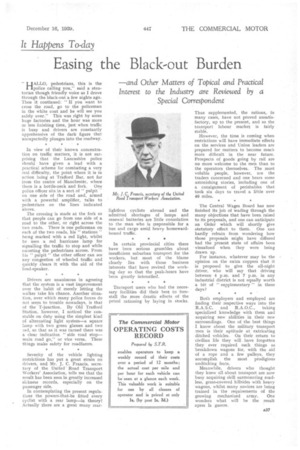It Happens To-day
Page 39

If you've noticed an error in this article please click here to report it so we can fix it.
Easing the Black-out Burden
" HALLO, pedestrians, this is the police calling you," said a stentorian though friendly voice as I drove through the black-out a few nights ago. Then it continued: " If you want to cross the road, go to the policeman in the White coat and he will see you safely over." This was right by some huge factories and the hour was more or less finishing time, just when traffic is busy and drivers are constantly apprehensive of the dark figure that unexpectedly plunges into the roadway.
In view of their known concentration on traffic matters, it is not surprising that the Lancashire police should have given a lead. with a practical scheme for combating a very real difficulty, the point where it is in action being at Trafford Bar, not far from the centre of Manchester, where
there is a bottle-neck and fork. One police officer sits in a sort of " pulpit on one side of the road and, armed with a powerful amplifier, talks to pedestrians on the lines indicated above.
The crossing is made at the fork so that people can go from one side of a road to the other, or right across the two roads. There is one policeman on each of the two roads, his " stations " being marked with a red light, whilst be uses a red hurricane lamp for signalling the traffic to stop and while escorting the pedestrians across. From his " pulpit " the other officer can see any congestion of wheeled traffic and quickly clears it with the aid of the loud-speaker.
Drivers are unanimous in agreeing that the system is a vast improvement over the habit of merely letting the walker take his chance. Another situation, over which many police forces do not seem to trouble nowadays, is that of the T-junction. By Old Trafford Station, however, I noticed the constable on duty using the simplest kind of alternating light system—a square lamp with two green glasses and two red, so that as it was turned there was a clear indication " side road stop— main road go," or vice versa. These things make safety for roadfarers.
Severity of the vehicle lighting restrictions has put a great strain on drivers, and Mr. J. C. Francis, secretary of the United Road Transport Workers' Association, tells me that the result has been seen in greatly increased sickness records, especially on the passenger side.
In contemplating the present regulations the powers-that-be fitted every cyclist with a rear lamp—in theory! Actually there are a great many rear lightless cyclists abroad and the admitted shortages of lamps and renewal batteries are Bale consolation to the man who is responsible for a bus and cargo amid heavy homewardbound traffic.
In certain provincial cities there have been serious grumbles about insufficient suburban transport for the workers, but most of the blame clearly lies with those business interests that have revised the working day so that the peak-hours have been greatly intensified.
Transport users who had the necessary facilities did their best to forestall the more drastic effects of the petrol rationing by laying in stocks. Thus supplemented, the rations,. in many cases, have not proved unsatisfactory, up to the present, and so the transport labour market is fairly stable.
However, the time is coming when restrictions will have immediate effects on the services and Union leaders are prepared for matters to become much more difficult in the near future. Prospects of goods going by rail are no more welcome to the men than to the operators themselves. The most voluble people, however, are the traders concerned and one hears some astonishing stories, including one of a consignment of perishables that took six days to travel a little over 40 miles.
The Central Wages Board has now finished its job of wading through the many objections that have been raised to its proposals, and one can anticipate an Order which will shortly give statutory effect to thein. One can hardly refrain from wondering how those proposals might have differed had the present state of affairs been visualized when they were being drawn up.
For instance, whatever may be the opinion on the extra coppers that it is proposed to give the all-night driver, who will say that driving between 4 p.m. and 7 p.m, in any industrial district is not equally worth a bit of " supplementary " in these days?
Both employers and employed are finding their respective ways into the R.A.S.C. and R.A.O.C., taking specialized knowledge with them and acquiring new abilities in their new surroundings. One of the best things I know about the military transport men is their aptitude at extricating ditched vehicles. On their return to civilian life they will have forgotten they ever required such things as breakdown wagons for, with the aid of a rope and a few pulleys, they accomplish the most prodigious unditching feats.
Meanwhile, drivers who thought they knew all about transport are now busy acquiring skill surmounting roadless, grass-covered hillsides with heavy wagons, whilst many novices are being trained in, the requirements of the growing mechanized army. One wonders what will be the result apres la guerre.




































































